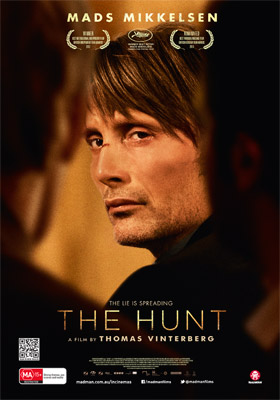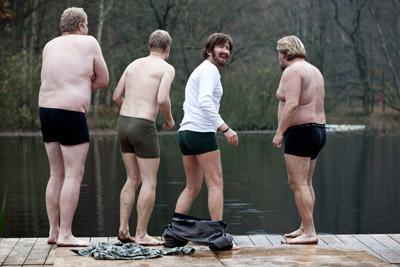Thomas Vinterberg The Hunt Interview

Thomas Vinterberg The Hunt Interview
Cast: Mads Mikkelsen, Thomas Bo Larsen, Bjarne Henriksen
Director: Thomas Vinterberg
Genre: Drama
Rated: MA15+
Running Time: 116 minutes
Synopsis: Mads Mikkelsen delivers a superb, award-winning performance in this electrifying new film from Thomas Vinterberg, the acclaimed director of The Celebration (Festen).
Lucas (Mads Mikkelsen) is beloved by his students and fellow teachers at his local kindergarten. After a divorce, made especially painful when his wife moved away from town with their teenage son, Marcus, Lucas' life is recovering with a new girlfriend, and the reforging of his relationship with Marcus. His world comes crashing down, however, when a young girl in his class accuses him of inappropriate behaviour. It's a simple lie that spirals out of control and the small community suddenly finds itself in a collective state of hysteria.
Long held friendships are tested as mistrust takes hold, and Lucas must summon all his strength in a brave fight for his life and dignity.
The Hunt
Release Date: May 2nd, 2013
Director's Statement
On a dark winter's night in 1999, there was a knock on my door. A renowned Danish child-psychologist stood outside in the snow with some documents raving about children and their fantasies. He spoke about concepts such as "repressed memory", and even more disturbing, about his theory that "thought is a virus". I didn't let him in. Didn't read the documents. Went to bed. Ten years later I needed a psychologist. I called him, and as a belated form of politeness, I read the documents. And was shocked. Spellbound. And I felt that here was a story that needed to be told. A story of a modern-day witch-hunt.
The Hunt is the result of this reading.
Interview with Thomas Vinterberg
Excerpts from an interview originally written by Mike Goodridge for the Danish Film Institute and published in the May 2012 issue of FILM.
Thomas Vinterberg has always sought new ways to push his artistic limits. Now, the Danish director is bringing a powerful drama to the world's most prestigious film festival. The Hunt, about a man wrongly accused who is exposed to the hatred of everyone in his small town, marks a return to the purity of vision he had at the beginning of his career, the director tells Mike Goodridge.
In the frenzy of excitement that greeted Thomas Vinterberg's international smash Festen (The Celebration) in 1998, he received numerous entreaties from all manner of people. One was a Danish psychiatrist who handed him a file of cases and said he had a responsibility to explore the other side of the abuse issues in the film. Overwhelmed with travel, development and new projects, he shelved it.
 Eight years later, Thomas Vinterberg was cleaning up his desk and came across the doctor's file. "I read it and was totally stunned by it," he explains. "I felt like I had to do this movie."
Eight years later, Thomas Vinterberg was cleaning up his desk and came across the doctor's file. "I read it and was totally stunned by it," he explains. "I felt like I had to do this movie." The film that evolved from that chance discovery is The Hunt, the director's seventh feature, and one which is bound to generate the international acclaim and controversy that he aroused with Festen 14 years ago. The subject this time is a false accusation against a mild-mannered kindergarten teacher called Lucas (played by Mads Mikkelsen). In the panic and hysteria that follows the accusation Lucas's life comes crashing down.
No instance of abuse wrongdoing takes place in The Hunt. It is a more classic story of an unjustly accused man. Lucas - who, Thomas Vinterberg says, is unquestionably innocent - becomes the target of hatred by all in the small rural town where the film is set. He is initially presented as a kind and beloved man but is vilified overnight, abandoned by his lifelong friends and physically assaulted. Thomas Vinterberg, 43, also found himself probing wider contemporary issues like the viral nature of thought and identity. "It's uncontrollable," he says. "Especially in the world today where communication is so easy, people are being judged morally in all sorts of different media. You can tell stories about another person that very quickly become the identity of that person. The people in this town give Lucas a mark and create an identity around him that he will never escape. I find that really interesting and frightening."
Portrait Of A Scandinavian Man
Central to the success of The Hunt is a powerful performance by Denmark's biggest star Mads Mikkelsen who subverts his hyper-masculine persona to play the hapless Lucas. It is the first time Thomas Vinterberg and Mads Mikkelsen have collaborated and Thomas Vinterberg describes the process as "absolutely wonderful."
"This character is in a way a portrait of a modern Scandinavian man," says Thomas Vinterberg. "He is warm, friendly, helpful and humble. He does everything people ask him to, he is being run over by his ex-wife. He is castrated in a way. And the journey we made with Mads Mikkelsen was to develop him from this person into the conflict of being a man. How does he keep his dignity without being violent? How does he manage this cold and brutal reality without taking a step from his Scandinavian character?"
"This very manly man, Mads Mikkelsen, came into the film with all his beauty and muscles and we decided to flip the character and make him a humble schoolteacher. We worked constantly at not trying to create a myth out of this person but to stay in real life, and Mads Mikkelsen is an expert at that. He is constantly demanding answers. Why am I doing that? Could I do this? Could I wear these? He would call me at any time asking different questions about the scenes and coming up with new lines. And when an actor gets the feeling that he knows the character through conversation and improvisation, then all the small details come. He feels calm enough to disappear into the unknown." Thomas Vinterberg recalls a pivotal scene in the film when, on Christmas Eve, Lucas goes to the local church service and faces a congregation of people who hate him.
"Mads Mikkelsen wept all day in every take in exactly the same way," says the director. "I've never seen anything so professional. The scene was all mapped out very precisely but we shot it from many different angles and he has to go through several stages - determination, collapse, anger, relief. He wept for eight hours and there are very few actors that can do that."
Confusing Success
Thomas Vinterberg describes The Hunt as a return of sorts to the purity of vision he had at the beginning of his career. He still considers his graduate film Last Round his best. "After that I did The Biggest Hero and Festen and those films were all very close to me in the sense that I can see myself in a very naked way in them," he explains.
The outsized success of Festen was confusing, he explains. "It didn't give me much. Artistically it took away my focus for quite some time. I was like a football player after a big goal and the camera was pointing at me for way too long. Now, I feel I am back and actually looking at my stories and looking at the world to find stories. Now I'm constantly trying to find this vulnerable pure quality from my graduate film, where there was no speculation about the future and you are very honestly trying to regard people in certain situations."
Like A Bicycle Team
The film which grounded Thomas Vinterberg again was Submarino, a gut wrenching study of two brothers wracked by addiction. The film was selected for competition at Berlin 2010 and earned him his best reviews since Festen. "With Submarino, I felt I sort of came back. If you consider Festen like an explosion, the dust had to settle for a bit and I felt I could continue with what I was doing before, knowing a little bit more about how things worked."
Submarino also saw him teamed up with hot new Danish writer Tobias Lindholm on the screenplay. Tobias Lindholm was fresh out of film school when he was drafted in to write the adaptation but has since co-written two seasons of the hit TV series "Borgen" and directed two of his own films R (with Michael Noer) and the forthcoming A Hijacking. It was only natural for Thomas Vinterberg to turn to Tobias Lindholm again on The Hunt.
"We are like a bicycle team when we are writing," he smiles. "Sometimes he is in front and I am following him and sometimes I am in front. We map out the story for quite some time together. We do a 10-page version, then a 20-page version and when we have an idea of the whole story, we start writing. The front bicycle writes 10 pages very fast without looking back and then the other one rewrites it. At the end you have a script which is a Tobias Lindholm/Thomas Vinterberg script which I then change to make my own."
The script of The Hunt approaches the story from an unusual angle in that it sticks closely to the Lucas character. Scenes you'd expect in classic witch-hunt movies - the townspeople getting together to fuel their rage, the police interrogation of the suspect - are not there.
"We tried to stay very close to the main character and avoid making a case study," he says. "This is fiction and we communicate through the heart and then it goes to the brain and back again. So we had to follow the emotional story of this person."
Demons and Victims
Also, it's an unusual story in that, for all the drama, everyone is innocent and thinking they are doing the right thing. Thomas Vinterberg is a parent himself and understands why and how adults become so aggressively protective of their children at the first whiff that they are in danger.
"The father of the little girl believes in his daughter like every parents should do, and I totally understand him," he muses. "Everybody has the feeling that you know your child, but there is this cliché about kids that they don't lie and in this film, we claim that they do: they invent stories, they often lie to make the grown-ups happy and in this case she is saying what is expected of her."
"Imagine sitting in front of a policeman or a psychologist or your parents who keep on asking you the same questions. What did you see? Did you see this? Did you see that? And imagine that after the third time, it becomes part of your imagination that it actually happened. As a child especially, it is more difficult to divide fiction from reality.
"So to some extent, the kids here are the demons of the film because they destroy a man's life, but it's very important for me to emphasise that in a case like this, the kids are also the victims. They are the ones we should protect the most."
By Mike Goodridge
MORE
- Mission: Impossible Fallout
- Glenn Close The Wife
- Allison Chhorn Stanley's Mouth Interview
- Benicio Del Toro Sicario: Day of the Soldado
- Dame Judi Dench Tea With The Dames
- Sandra Bullock Ocean's 8
- Chris Pratt Jurassic World: Fallen Kingdom
- Claudia Sangiorgi Dalimore and Michelle Grace...
- Rachel McAdams Disobedience Interview
- Sebastián Lelio and Alessandro Nivola...
- Perri Cummings Trench Interview



